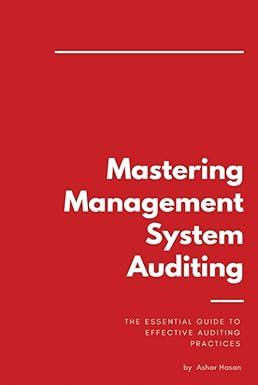Question
QUESTION 2 2.1 Read the case study and answer questions 2.1.1 2.1.5 Case Study: Implementing Zero-Based Budgeting in XYZ Retailers, South Africa Background: XYZ Retailers,
QUESTION 2
2.1 Read the case study and answer questions 2.1.1 2.1.5
Case Study: Implementing Zero-Based Budgeting in XYZ Retailers, South Africa
Background:
XYZ Retailers, a leading South African retail company, operates in a competitive market with evolving consumer preferences and cost pressures. To adapt to this dynamic environment, the management is considering the adoption of Zero-Based Budgeting (ZBB) as a strategic financial approach.
XYZ Retailers currently operates 50 stores across South Africa, offering a wide range of products in various categories including apparel, electronics, home goods, and groceries. In the last fiscal year, the company recorded a total revenue of ZAR 500 million, with an operating expense of ZAR 350 million.
2.1.1 Explain what Zero-Based Budgeting (ZBB) is and how it differs from traditional budgeting. (4)
2.1.2 Advise XYZ retailers by listing and explaining the 6 key fundamentals essential for a successful implementation of Zero-Based Budgeting (ZBB) (6)
2.1.3 Provide 4 advantages and 6 disadvantages of implementing Zero-Based Budgeting in the context of XYZ Retailers (10)
2.1.4 Describe how XYZ Retailers can implement Zero-Based Budgeting effectively. (5)
2.1.5 How does a master budget differ from Zero-Based Budgeting?
2.2 Scenario: (4)
Connection Limited is a company that manufactures and sells camera lenses. They have recently completed a financial period and are analysing their performance using various variance analysis techniques. The following questions and answers provide calculations for two specific variances: Sales Volume Variance and Direct Materials Price Variance.
Given:
Actual Units Sold = 2,000
lenses Budgeted Unit Sales = 3,000
lenses Standard Profit Per Unit = R272
2.2.1 Calculate the Sales Volume Variance for Connection Limited based on the given information. (3)
2.2.2 Calculate the Direct Materials Price Variance for Connection Limited based on the given information. (3)
Given:
Standard Unit Cost = R40 per kg
Actual Unit Cost = R38 per kg
Actual Units Purchased = 4,400 kg
Step by Step Solution
There are 3 Steps involved in it
Step: 1

Get Instant Access to Expert-Tailored Solutions
See step-by-step solutions with expert insights and AI powered tools for academic success
Step: 2

Step: 3

Ace Your Homework with AI
Get the answers you need in no time with our AI-driven, step-by-step assistance
Get Started


